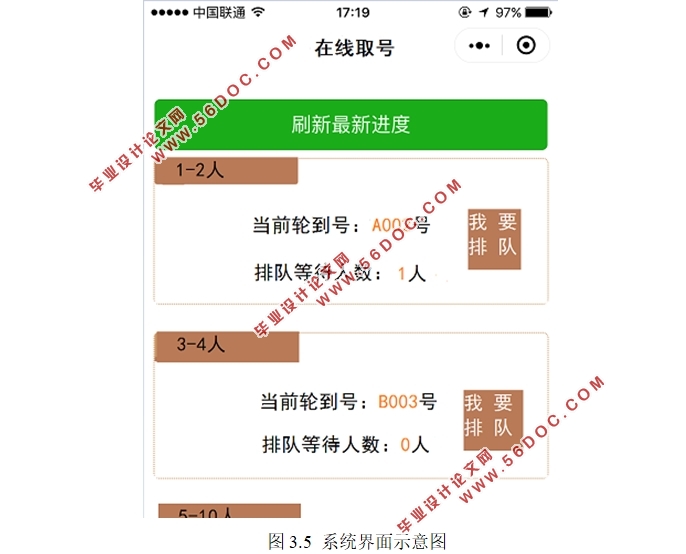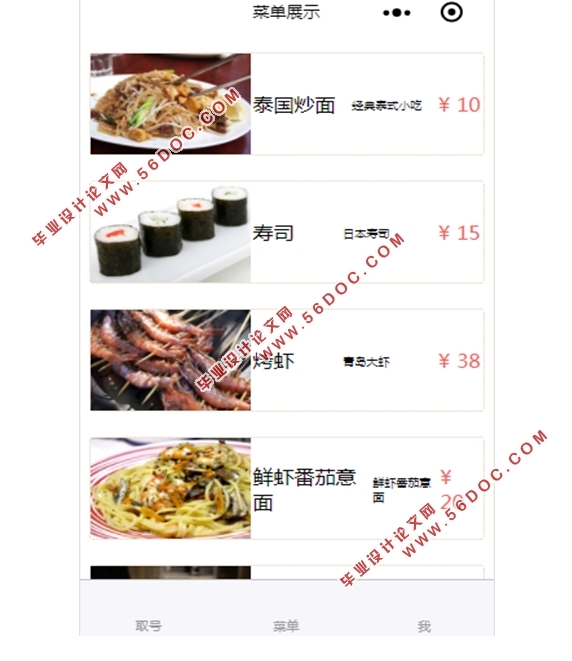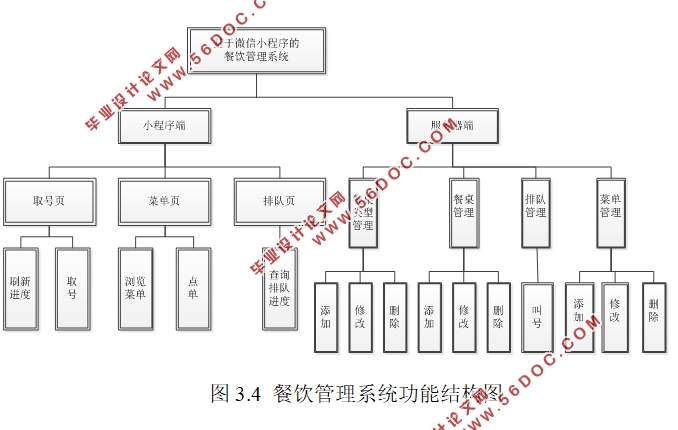基于微信平台的餐饮管理系统的设计(任务书,开题报告,论文17000字,参考代码)
摘要
如今,移动互联网开始兴起发展,作为新兴而蓬勃发展的一种信息技术,互联网在传统工业和社会中所发挥的作用变得越来越大,互联网与整个社会正在加快加深更进一步的融合。而微信在当今社会已经是一个火热的新媒体传播平台。就餐饮业来说,其更关注的是流量和服务。通过利用二维码入口、微信链接分享、周围的店铺等多种入口,微信小程序出色的解决了餐饮行业所最关注的流量问题。以往,餐厅和客户交流互动的过程只能等到顾客进入店面才开始,可现在,在店面之外皆可发生。随着微信小程序的出现,顾客预约、下单等行为得到了极大的便利,也大大精简并优化了餐饮企业的服务流程,提升了餐厅的服务质量。微信小程序能够发挥店铺的服务特色,让顾客通过扫码即可获取店铺的相关信息,还可以将线上流量引至线下,使顾客能够线上点餐,线下就餐,极大的提升了客人的就餐体验,从而使盈利收益得到提升。
本文据此设计了一款基于微信平台的餐饮管理小程序。能实现菜单的查看,排队情况的查看及排号、点餐、付款等功能。具体工作如下:
研究学习了微信小程序的开发流程及所需开发技能。完成了本系统的设计与实现。包括系统整体的设计,各部分的设计以及数据库的设计等。其中,系统设计有系统结构的设计、系统功能的设计、系统界面的设计。而数据库的设计主要包括系统数据库的概念以及逻辑结构设计。最后实现了本系统的各项设计并完成了系统测试。
关键词:MySQL;餐饮管理;微信小程序
Abstract
Nowadays, the mobile Internet is beginning to rise and develop. As a new and flourishing information technology, the Internet plays a more and more important role in the traditional industry and society. The Internet and the whole society are accelerating to deepen and deepen the integration.WeChat has been a hot new media platform in today's society. Catering industry is concerned with traffic andservices. By using the entrance of the two-dimensional code under the line, the WeChat link sharing, the stores around, and so on, the WeChat applet successfully solved the traffic problem concerned by the catering industry. In the past, the interaction process between restaurants and customers could only start when customers entered the store, but now it can happen outside the store. With the emergence of small programs, customer reservation, order, payment and other behaviors have been greatly facilitated. It also greatly streamlines and optimizes the service process of catering enterprises, and improves the service quality of the restaurant. The WeChat small program can give full play to the store's service features, let customers get the information about the store through the scavenging code, and can also lead the online traffic to the offline, so that the customer can eat on the line and the line is on the line, which greatly improves the guest's dining experience, thus improving the profit profit.
This paper designs a small catering management program based on WeChat platform. Specifically, the menu can be viewed, queuing, checking, arranging, ordering, paying and so on. The specific workis as follows:
Research and development of WeChat mini program development process and the necessary development skills. The design and implementation of this system have been completed. It includes the design of the whole system, the design of each part and the design of database. The system design includes the design of the system structure, the design of the system function and the design of the system interface. The design of database mainly includes the concept of system database and the design of logical structure. Finally, the design of the system has been realized and the system test has been completed.
Keywords:My SQL; Restaurant Management; WeChat Mini program



目录
摘要 I
Abstract II
第1章绪论 1
1.1研究背景及意义 1
1.2国内外研究现状 1
1.3研究内容 2
1.4 论文结构 3
1.5 本章小结 3
第2章相关理论及技术综述 4
2.1 微信小程序 4
2.1.1 微信小程序开发 4
2.1.2 微信小程序开发框架 5
2.1.3 微信小程序的API接口 6
2.2 ThinkPHP3.2框架 6
2.3 本章小结 6
第3章系统需求分析与设计 7
3.1餐饮管理系统需求分析 7
3.1.1 用户需求分析 7
3.1.2 系统功能需求分析 8
3.1.3 系统可行性分析 9
3.1.4 系统性能分析 10
3.2 系统设计 10
3.2.1 系统结构设计 11
3.2.2 系统功能设计 11
3.3 系统数据库设计 12
3.3.1 数据库概念设计 12
3.3.2 数据库逻辑结构设计 13
3.4 系统界面设计 14
3.5 本章小结 15
第4章系统实现及测试 16
4.1 微信授权登录 16
4.1.1 微信登录 16
4.1.2 服务器端:code换取session_key 17
4.1.3 数据签名加密 18
4.2 排号页 20
4.2.1 服务器端接口 20
4.2.2 小程序端实现 20
4.3 确认取号页 22
4.3.1 服务器端接口 22
4.3.2 小程序端实现 23
4.4 我的排号页 24
4.4.1 服务器端接口 24
4.4.2 小程序端实现 25
4.5 查看菜单页 26
4.5.1 服务器端接口 26
4.5.2 小程序端实现 27
4.6 系统测试 28
4.7 本章小结 30
第5章总结与展望 31
5.1 总结 31
5.2 研究展望 31
参考文献 33
致谢 34
|







